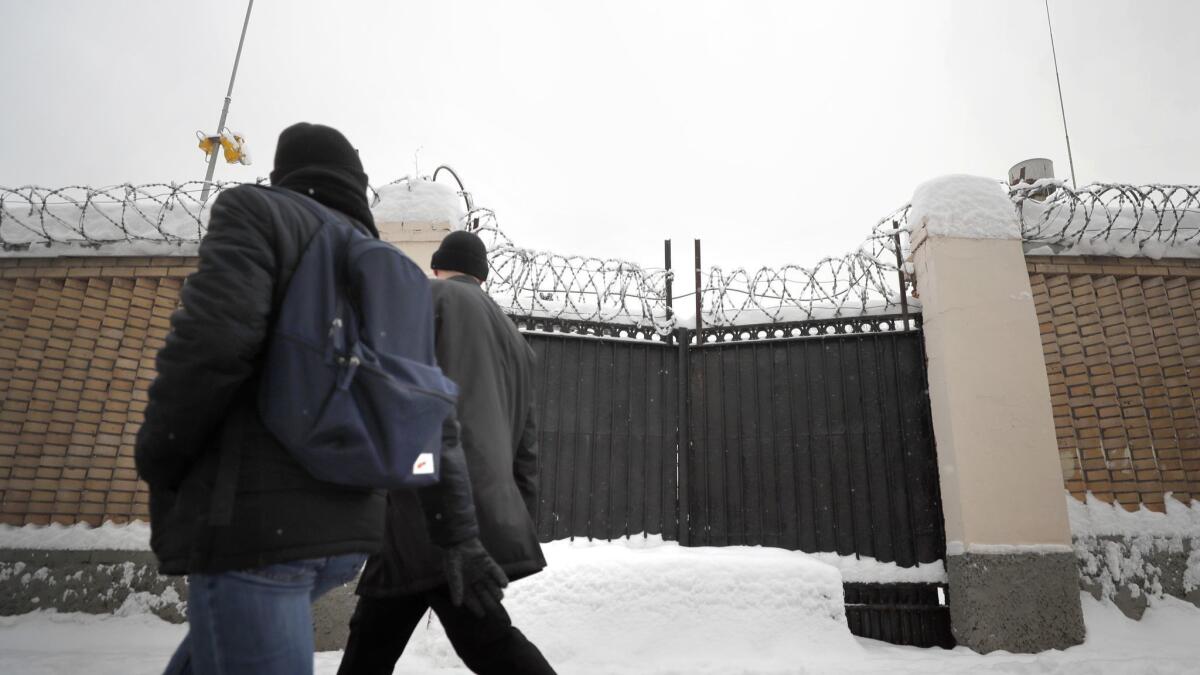American held on spying charge in Moscow also had British citizenship — and perhaps others
- Share via
Reporting from London — The former U.S. Marine whose detention in Moscow on espionage charges has drawn global attention may also have British, Irish and Canadian citizenship, which could intensify what’s become a Cold War-style standoff between Russia and the West.
The United Kingdom said Thursday that Paul Whelan held a British passport, and it warned Russia about the risks of using Whelan — a 48-year-old Michigan-based security director who was reportedly in Moscow to attend a wedding — as a “pawn” in some geopolitical game.
It is believed that Whelan also holds Canadian and Irish passports. The Irish Embassy and the Canadian Embassy in Moscow both said they have asked to visit Whelan to offer consular services. Whelan was arrested Dec. 28 at his Moscow hotel.
Russia’s Federal Security Services officers accused Whelan of being a spy but have yet to give any details of what he’s accused of doing. A Moscow court formally charged him with espionage Monday. Vladimir Zherebenkov, Whelan’s Russian lawyer, has requested that his client be released on bail.
Whelan’s family has said he is innocent and was in Moscow to attend a friend’s wedding. He served in the U.S. Marine Corps from 1994 to 2008, when — the Washington Post reported — he was discharged after being found guilty of attempting to steal more than $10,000 in currency from the U.S. government while deployed in Iraq and bouncing nearly $6,000 worth of checks. Now Whelan is director of global security at BorgWarner, a Michigan-based automotive parts supplier. According to his family, he has a fondness for Russia and has made several trips to the country.
Russian security services have revealed little about its investigation, but earlier this week, Russian news agency Rosbalt, which is considered to have close ties to security services, reported that Whelan was caught “red-handed” at the Metropol hotel in central Moscow with a flash drive containing a classified list of names of Russian security services employees. If convicted, Whelan faces a potential prison term of up to 20 years.
Whelan was born in Canada to British parents. While dual citizenship is not unusual, his British passport adds an interesting dynamic to the case, given Russia’s strained relationship with Britain.

London has accused the Kremlin of ordering its security agents to poison a former Russian spy and his daughter in England. British investigators said Sergei and Julia Skripal were poisoned in March with the Russian-made nerve agent Novichok. The Kremlin has denied the allegations. The U.K. ousted more than 20 Russian diplomats in the wake of the incident, and the U.S. imposed economic sanctions on Russia. Both Skripal and his daughter survived.
British Foreign Secretary Jeremy Hunt said he was “extremely worried” about Whelan’s fate. The remarks reflect a growing sense that the Whelan arrest may be Russia’s retaliation for the U.S. detention of Russian Maria Butina, who pleaded guilty last month to conspiring with a senior Russian official to infiltrate the conservative movement in the U.S. as an agent for the Kremlin. Despite her plea, the Kremlin has rejected the accusation and views Butina as a political prisoner in a diplomatic standoff between Russia and the West.
“Typically, when Russia views a person on its soil to be ‘undesirable,’ it either denies them a visa, asks them to leave the country, or deports them via a brief detention,” said Samuel Ramani, a doctoral candidate in international relations at St. Antony’s College, University of Oxford, who specializes in Russian foreign policy.
“It’s Russia’s way of showing it can give back to the United States what the U.S. dishes out to them, effectively like the mutual expulsion of diplomats being extended to legal proceedings,” he said.
With relations between Moscow and Washington at a low, it’s possible that “Russia feels that the U.S. relationship is a lost cause and it can engage in more risky actions, like arresting American nationals,” Ramani said.
U.S. Ambassador to Russia Jon Huntsman visited Whelan in the Lefortovo detention center in Moscow on Wednesday and told his family he had demanded that Whelan be treated fairly.
Much remains unclear about why Russian security services targeted Whelan. The U.S. has said it was waiting for more information from the Russians and would act accordingly.
The danger, wrote Mark Galeotti, a senior researcher at the Institute of International Relations Prague, in an editorial for the Moscow Times, is that “we are sliding into an era when civilians become pawns in the game of modern statecraft.”
Twitter: @sabraayres
Ayres is a special correspondent.
More to Read
Sign up for Essential California
The most important California stories and recommendations in your inbox every morning.
You may occasionally receive promotional content from the Los Angeles Times.














